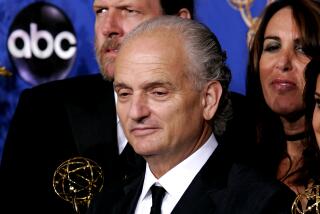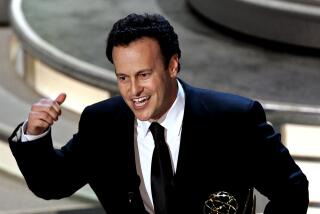Lining Up the Good and Bad, Two by Two
- Share via
The last 12 months of this century were more of the best of times and the worst of times for television. Serving tradition, it was a year of great contrasts, with a few soaring highs, many bottom-skimming lows and lots of gray in the middle.
Although lowlights greatly outnumbered highlights, in the interest of balance, here are some of them tit for tat.
High. “The Sopranos.” Another brutal Mafia crusher who keeps his goombahs in order and his conflicts to a minimum by head-bashing and even more extreme acts of violence? Ho-hum. One more stereotype to tee off Italian Americans.
Except that familial-challenged Tony Soprano was anything but predictable, at times seeming almost redeemable while facing a Machiavellian mom among other challenges at home and at the “office,” in this unique, expertly written and acted strip of darkly satirical drama that succeeded “The Larry Sanders Show” as HBO’s elite, signature series.
And more challenges await “The Sopranos” in 2000 in the form of huge expectations. Returning for a second run Jan. 16, it will be closely watched to see if it remains on a level that few TV efforts have even glimpsed, let alone approached.
Low. News coverage throughout the year. For symbolism, try the morning of Dec. 8, when President Clinton went on TV--in what was billed as his last press conference of the century--to announce dramatic peace progress in the Middle East between old foes Israel and Syria.
Cable’s 24-hour news channels covered this rather momentous event live. But in Los Angeles, where stations break into regular programming to televise nearly every police/fugitive freeway pursuit that comes along, Clinton’s remarks were mostly ignored that morning. One station that did deem him important enough to cover live was KTTV. Bravo! Except it then reverted to character by interrupting Clinton for live coverage of another breaking story. You need to ask?
A car chase.
It was a seminal moment that burned rubber across news priorities and news judgment in a year that also saw much of the media perform abysmally, on stories ranging from Clinton’s impeachment trial and acquittal to the plane crash that killed John F. Kennedy Jr., his wife and sister-in-law. On the latter, for example, just as the death of Princess Diana became the media’s most embarrassing spectacle of 1997, so did JFK Jr. somehow earn their halo two years later. How?
By dying.
Their pulses thumping like tom-toms, by the time TV’s fawning opportunists had completed their worshipful coverage of that tragedy and subsequent burial at sea, you’d have thought Kennedy not only had been delivered to the ocean, but also had walked on it.
Equally deficient in different ways was TV reporting of the recent World Trade Organization meeting in Seattle, its coverage centering almost exclusively on the destructive turbulence created by a small minority of so-called anarchists rather than on the legitimate issues driving peaceful protests by a wide variety of interest groups.
As always, those screaming loudest earned the most attention.
High. Clinton signing into law legislation introduced by Rep. Elton Gallegly (R-Simi Valley) that in effect banned “crush videos” showing such small animals as kittens, puppies, hamsters and birds being tortured and stomped to death by scantily clad, stiletto-heeled women for the sexual gratification of viewers. Sold over the Internet, these sadistic videos must be seen and heard to be believed. But who would want to beyond the freaks who make them and find them a sexual turn-on?
Low. “National Desk.” Slanted reporting is unethical whether favorable to the left or right. It’s the latter whose opinions dominate this ongoing series of PBS documentaries on political issues. The worst of the dishonest 1999 bloc was titled “The War on Boys.” It was a Fred Barnes-reported hour whose one-sided arguments and unsupported broad swipes were selectively drawn from sources contending that feminists were not only making war on little boys but also driving many to suicide.
High. “Jiminy Glick’s La La Wood.” Emerging from the first season of an otherwise humdrum Martin Short talk show was this gushy, triple-chinned Short creation who was a devastating sendup of TV’s fawning entertainment reporters. There was nothing more hilarious on TV in 1999 than Jiminy. Except, arguably, the noodles he was parodying.
Low. That great kidder Monica Lewinsky appearing on NBC’s “Saturday Night Live” in sketches making light of her role in the sex scandal that became foreplay for the tortuous impeachment proceedings that nearly shelved the Clinton presidency. As if it were all a hoot.
High. This was going to be a “Low.” Then Fox changed its mind about staging a plane crash in the Mojave Desert on live TV as part of a ratings-sweeps special titled “Jumbo Jet Crash: The Ultimate Safety Test.” The change of heart by TV’s crassest, anything-for-a-buck network was influenced, no doubt, by the tragedy of EgyptAir 990 and by criticism from environmentalists, government officials and the U.S. Marine Corps.
Not to worry, though, for Fox surely will think of another sweeps project as a replacement. Such as crashing an ocean liner into an iceberg to see if it sinks as fast as the Titanic. Or blowing up a skyscraper. Or setting fire to a forest. Or . . .
Low. The smear campaign against former “60 Minutes” reporter-producer Lowell Bergman by the show’s executive producer, Don Hewitt, and ace correspondent Mike Wallace. They didn’t like being shown weakly acquiescing to their CBS bosses in “The Insider.” That is Michael Mann’s movie about “60 Minutes” initially yanking, on network orders, a Bergman-developed, Wallace-reported piece featuring a whistle-blower’s damaging charges against tobacco giant Brown & Williamson. The film has Hewitt barely resisting, and Wallace initially caving in, in contrast to fierce resistance by Bergman, who is shown doing most of the work on the story, which later ran on “60 Minutes” only after the guts of it had been reported elsewhere.
It’s one thing to attack Mann and the movie for excessive dramatic license; there’s room for argument there. It’s quite another to make personal attacks on the award-laden Bergman, one of the ablest, most tenacious reporters in the business, which Hewitt and Wallace have done in interview after interview while contesting his hero status in the movie. More than just hardball, this is beanball. If Bergman was such an empty suit, how curious that “60 Minutes” let him do important stories and paid his salary all those years.
High. The Burns brothers. This was a year when filmmakers and former collaborators Ken Burns and Ric Burns each made superb historical documentaries for PBS about epic features of the United States topography.
For older brother Ken, it was “Not for Ourselves Alone: The Story of Elizabeth Cady Stanton & Susan B. Anthony,” an ever-smart-and-entrancing series that mingled the biographies of these close friends and tireless crusaders who created the framework for ratification of the 19th Amendment, giving women the vote in 1920.
Just as worthy, and even more ambitious, was Ric’s “New York: A Documentary Film,” a stunning 10 hours on the evolution of Manhattan, from its inception as a Dutch colony to its mid-19th century status as a metropolis defined by the Empire State Building and Gershwin’s “Rhapsody in Blue.”
Low. “Private Dicks: Men Exposed.” HBO was hardly master of its domain when airing this penis-ogler that included an elderly man disclosing that his nickname in his youth was “dwarf,” a title that also defined the aspirations of this quasi-porn disguised as a documentary.
High. “Noah’s Ark.” Take Lot’s wife . . . please! A creative disaster of biblical proportions, this NBC miniseries was so laughably bad--turning the great arkster into a straight man for Borscht Belt jokes--that it was quite wonderful. How bad was it? So bad that just watching could turn you into a pillar of salt. Hayohhhhhh!
Low. Dennis Rodman’s brief comeback in burgerdom. Would you buy even an onion ring from this man? Thinking that you would after he signed with the Los Angeles Lakers, Carl’s Jr. resumed running Rodman-featured TV ads that it had canceled (after he was suspended for kicking a cameraman) and later restarted but yanked again (after he publicly lambasted Mormons).
Even a fast-food chain with fries for brains ultimately comes around, though. After the loopy Rodman and the Lakers parted in 1999, Carl’s again parted with him.
A fitting commentary on another TV year in which profit and good judgment were at times in conflict.
More to Read
The complete guide to home viewing
Get Screen Gab for everything about the TV shows and streaming movies everyone’s talking about.
You may occasionally receive promotional content from the Los Angeles Times.






